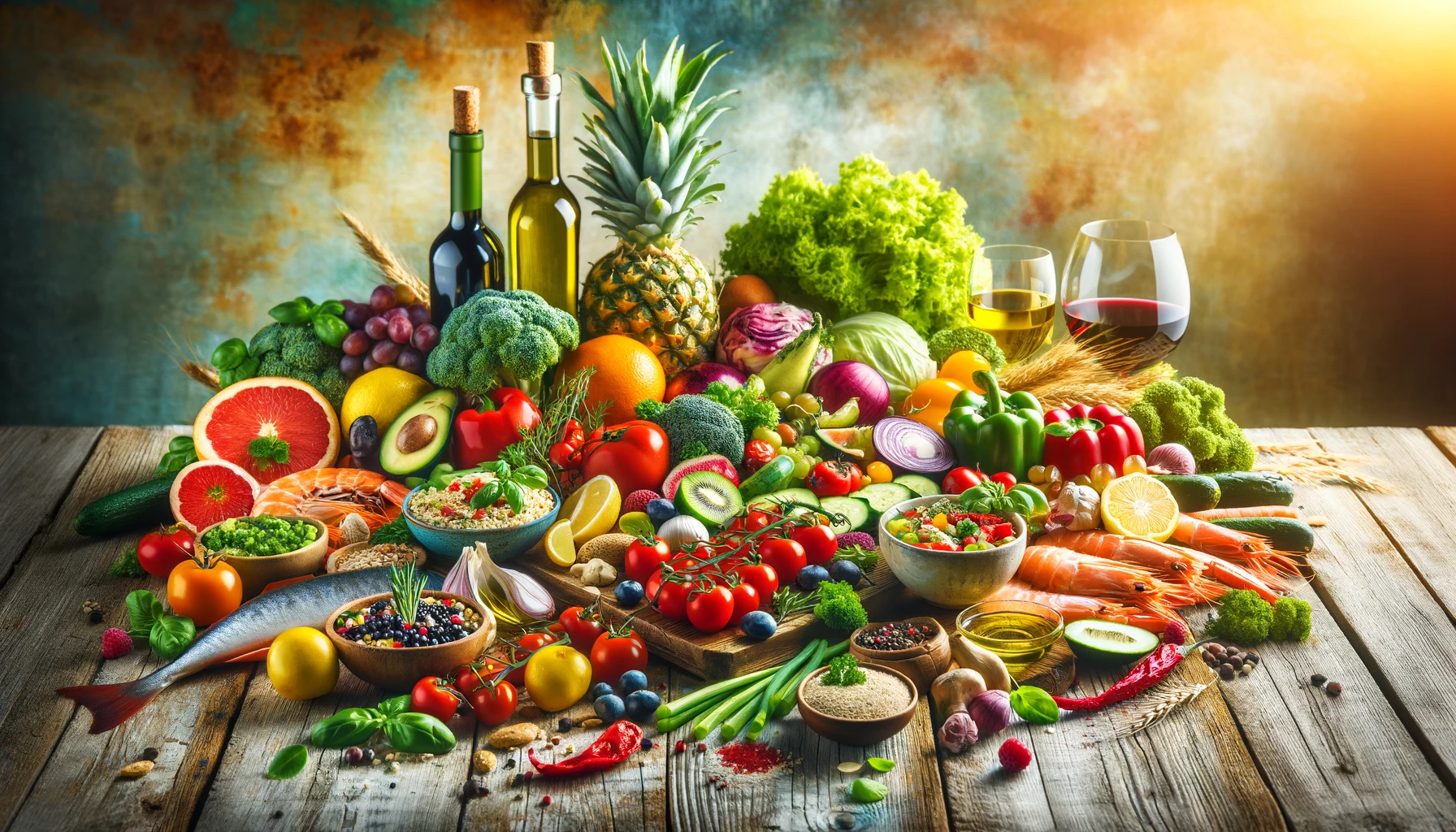Congratulations! You’ve chosen the Mediterranean Diet, a culinary adventure that’s less about “dieting” and more about enjoying life one olive at a time. But before you start draping yourself in togas and speaking with a faux Italian or Greek accent, let’s get real about what this diet actually involves.
A Brief History: More Than Just a Trendy Diet
Before we dive into the ocean of olive oil and swim through seas of whole grains, let’s set the stage with a little background.
The Mediterranean Diet isn’t a product of the 21st-century diet craze. It’s a time-tested, grandmother-approved way of eating, deeply rooted in the lifestyles of those living around the Mediterranean Sea. This includes countries like Italy, Greece, Spain, and parts of the Middle East and North Africa. It’s not just a diet; it’s a cultural heritage, passed down through generations like a precious family recipe.
Imagine a diet that’s a tapestry of rich traditions, where every meal is a celebration of life. The Mediterranean Diet reflects the diverse cultures and histories of the Mediterranean basin. It’s a way of eating that’s as varied as the landscapes it comes from, blending the spices of Morocco with the olives of Greece and the seafood of the Italian coast. It’s a culinary journey that tells a story of people, places, and a shared love for good food.
Health Benefits: Not Just Good, But Good for You
Now, let’s talk health. The Mediterranean Diet isn’t just good for your taste buds; it’s a boon for your body too. Research has linked this way of eating to a plethora of health benefits. It’s like hitting the jackpot in the health lottery:
- Heart Health: Studies suggest that the diet can improve heart health, reducing the risk of heart disease. It’s like giving your heart a hug with every meal.
- Weight Management: It can help with weight loss and management. Who knew eating delicious food could also mean fitting into those jeans you’ve been eyeing?
- Diabetes Prevention: It may reduce the risk of type 2 diabetes. Yes, your body will thank you for those olives and whole grains.
- Cognitive Health: There’s evidence it could improve brain function and protect against cognitive decline. It’s brain food, literally.
- Longevity: People following this diet tend to live longer, healthier lives. It’s like finding the culinary fountain of youth.
The Diet: A Symphony of Simplicity and Freshness
The Mediterranean Diet is simple yet sophisticated. It emphasizes fresh, whole foods over processed ones. It’s about savoring the natural flavors of fruits, vegetables, grains, and lean proteins, and yes, a generous helping of olive oil. It’s less about strict rules and more about enjoying food in its most natural state.
Now that you’re versed in the historical and cultural significance of the Mediterranean Diet, as well as its multitude of health benefits, let’s dive into the specifics.
Key Components of the Mediterranean Diet:
1. The Magic of Olive Oil: Because Butter is So Last Century
First things first, olive oil is your new best friend. This isn’t just any oil; it’s the elixir of life according to those who live by the Mediterranean Sea. They might be onto something, considering they often live to be a hundred while still dancing the sirtaki. But remember, drizzling olive oil on your double cheeseburger doesn’t make it Mediterranean, it just makes it oily.
2. Fruits and Vegetables: Nature’s Candy, or So They Say
If your idea of a fruit serving is the cherry on top of your sundae, we need to talk. The Mediterranean Diet is big on fruits and vegetables. Yes, those green and colorful things you usually pass by in the grocery store. They’re not just for decoration; apparently, they’re edible and good for you. Who knew?
3. Fish: Because Who Needs Red Meat Every Day?
The diet also emphasizes fish and seafood, which is great news if you like your protein with a side of scales. And no, fish sticks don’t count, no matter how much tartar sauce you use. I’m talking fresh, grilled, and maybe even caught by a rugged fisherman named Giorgos.
4. Nuts and Seeds: Unleash Your Inner Squirrel
Nuts and seeds are also a staple. Now, before you start hoarding them for winter, remember moderation is key. These aren’t just snacks for your next Netflix binge; they’re sources of healthy fats. So, maybe don’t eat them by the handful like you’re at a Vegas slot machine.
5. Dairy: Yes, Cheese is Still in Your Life
Don’t worry, cheese hasn’t been banished. But I’m talking about the fancy kind, like feta and goat cheese, not the suspiciously orange stuff that comes in a can. Dairy is part of the diet, but think garnish, not main course. And no, a cheese fountain doesn’t count as a serving.
6. The Occasional Glass of Red Wine: Because We’re Classy
Who knew that red wine is encouraged, in moderation? This isn’t a green light to drink like Dionysus at a frat party. Think more like sipping a glass while discussing Plato, or pretending to.
7. Whole Grains: Because Refined is So Unrefined
The Mediterranean Diet embraces whole grains like they’re going out of style. But these aren’t your average bleached, processed grains that could survive a nuclear apocalypse. I’m talking whole, unrefined, and full of fiber – the kind that doesn’t dissolve into mush at the first hint of sauce.
8. Pasta: A Love Story
Pasta, the cornerstone of comfort food, is very much a part of this diet. But before you start boiling a pot large enough to bathe in, remember moderation. And no, a ‘serving’ isn’t the size of your head. Think smaller, like a side dish. And pair it with vegetables, not just a mountain of cheese.
9. Bread: The Siren Call of the Carbs
Bread is also on the menu, but I’m not talking about that pre-sliced, pillow-soft stuff that’s more air than bread. I mean the hearty, crusty, whole-grain kind that actually requires chewing. And try to resist the urge to slather it in butter. Remember, olive oil is your bread’s soulmate now.
10. Walking: More Than Just a Way to Get to the Fridge
Now, let’s talk about the other side of the Mediterranean lifestyle – exercise. Yes, unfortunately, the diet doesn’t include a clause about the miraculous melting away of pounds while you lounge on the couch.
The people of the Mediterranean aren’t just sitting around eating olives all day. They’re active, often walking everywhere. So, maybe consider walking to the store instead of driving. Or at least park farther away. Every step counts, especially if it’s towards a plate of hummus.
11. Dancing: Shake It Like You’re in a Greek Taverna
And then there’s dancing. Have you ever seen a Greek wedding? Those folks know how to move. So, put on some music and dance around your kitchen. It’s exercise, it’s fun, and it’s a lot less boring than running on a treadmill staring at a wall.
And that’s the essence of the Mediterranean Diet – eating real, whole foods, enjoying life, and being active. It’s less about counting every calorie and more about making healthier choices. So, embrace your inner Mediterranean spirit. Eat well, laugh often, and maybe dance a little when no one’s watching. Or even when they are – after all, you’re practically a deity now, remember?
Pro Tips: Savoring the Mediterranean Lifestyle
Here are some pro tips to help you fully embrace the Mediterranean Diet and lifestyle. These aren’t just tips; they’re nuggets of wisdom to enrich your journey.
- Farmers Markets are Your New Hangout
Skip the frozen aisle and make farmers markets your new best friend. Fresh produce isn’t just healthier; it’s like a rainbow for your plate. Plus, you get to feel all sophisticated and eco-friendly.
- Get Creative in the Kitchen
Experiment with herbs and spices. The Mediterranean Diet is like a playground for your taste buds. Basil, oregano, rosemary, and thyme are not just names of a folk band from the 60s; they’re your new culinary arsenal.
- Mindful Eating
Mediterranean eating is as much about how you eat as what you eat. Take time to savor your food. Eating slowly isn’t just polite; it’s a way to appreciate your food and recognize when you’re full. It’s not a race; your plate won’t run away.
- Make Meals a Social Affair
Eating is a communal experience in Mediterranean cultures. Share meals with friends and family. It’s about nourishment and bonding. Plus, it’s harder to eat an entire loaf of bread when others are watching.
- Stay Active Naturally
Incorporate more physical activity into your daily routine. Take a cue from the Mediterraneans: walk, dance, garden, or just move more. Every bit counts, and no, moving your hand from a chip bag to your mouth doesn’t count.
- Be Environmentally Conscious
The Mediterranean Diet isn’t just good for you; it’s good for the planet. Eating more plant-based foods and less meat is eco-friendly. Plus, you get to feel like a superhero saving the planet, one meal at a time.
- Flexibility is Key
The diet is more of a guideline than a set of strict rules. Adapt it to your taste and lifestyle. It’s about enjoyment and health, not deprivation. If you don’t like olives, don’t force them. There’s plenty of other fish (and fruits, and veggies) in the sea.
What Exactly Can You Eat on the Mediterranean Diet?
Embarking on the Mediterranean Diet means embracing a variety of delicious, wholesome foods. It’s about saying ‘yes’ to a wide range of ingredients that not only tantalize your taste buds but also nourish your body. Here’s a rundown of what you can eat on this vibrant diet.
Fruits and Vegetables: The Colorful Staples
- Fresh and Seasonal: Load up on a variety of fruits and vegetables. Think leafy greens, tomatoes, cucumbers, broccoli, spinach, onions, carrots, apples, bananas, oranges, pears, grapes, figs… the list is endless.
- Versatility: Enjoy them raw in salads, roasted, grilled, or even in stews and soups.
Whole Grains: The Heartier, the Better
- Diverse Choices: Incorporate grains like whole wheat, brown rice, barley, quinoa, and farro into your meals.
- Creative Uses: Use them in salads, as sides, or in hearty grain bowls.
Healthy Fats: Embrace the Oil and Nuts
- Olive Oil: The star of the diet. Use it for cooking, dressings, and dips.
- Nuts and Seeds: Snack on almonds, walnuts, pistachios, sunflower seeds, and more. Remember, moderation is key.
Protein: Beyond Just Meat
- Fish and Seafood: Aim for at least two servings a week. Salmon, mackerel, trout, sardines, and shellfish are excellent choices.
- Poultry and Eggs: Chicken and turkey are preferred over red meats. Eggs are also a great option.
- Legumes: Beans, lentils, chickpeas, and peas are excellent plant-based protein sources.
Dairy: Choose Wisely
- Moderation and Quality: Include moderate amounts of dairy, focusing on quality. Greek yogurt, feta, and Parmesan are excellent choices.
- Use as a Topping: Rather than the main component, use cheese as a garnish or in small amounts.
Herbs and Spices: The Flavor Makers
- Natural Flavoring: Season your dishes with herbs like basil, oregano, rosemary, thyme, and spices like garlic, cinnamon, and pepper.
Sweets: A Treat, Not a Staple
- Natural Sweetness: Opt for fruit-based desserts. Honey is a good sweetener choice.
- Occasional Indulgence: Save the richer desserts for special occasions.
Frequently Asked Questions (FAQs)
Absolutely! The diet is highly adaptable for vegetarians and vegans, focusing on plant-based foods, legumes, nuts, seeds, and whole grains.
Yes, coffee and tea are fine on the Mediterranean Diet. Just be mindful of the amount of sugar and cream you’re adding.
The diet is rich in heart-healthy fats (like those in olive oil and fish), high in fiber, and includes limited red meat and processed foods, which can help reduce the risk of heart disease.
Not necessarily. The focus is on eating whole, nutrient-dense foods and listening to your body’s hunger cues, rather than strict calorie counting.
– Buy in Bulk: Purchase grains, legumes, and nuts in bulk.
– Seasonal Produce: Opt for fruits and vegetables that are in season.
– Local Seafood: Choose local fish or canned options like sardines or tuna.
– Plan and Prep: Meal planning and preparation can help minimize waste and save money.
– Nuts and Seeds: Almonds, walnuts, or sunflower seeds.
– Fruit: Fresh or dried fruit like figs or dates.
– Yogurt: Greek or plain yogurt with a drizzle of honey.
– Hummus: With vegetables or whole-grain crackers.
– Meal Prep: Prepare meals in advance to save time.
– Simple Recipes: Focus on simple, quick-to-prepare dishes.
– Canned and Frozen Options: Use canned fish and frozen vegetables to cut down on prep time.



